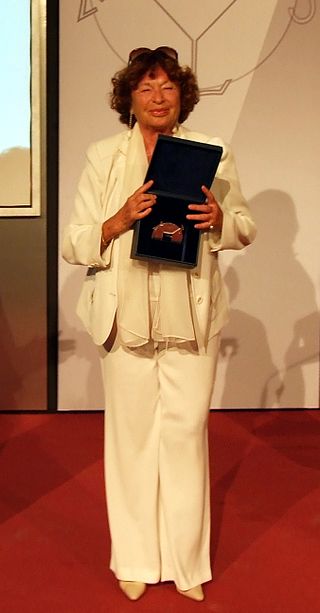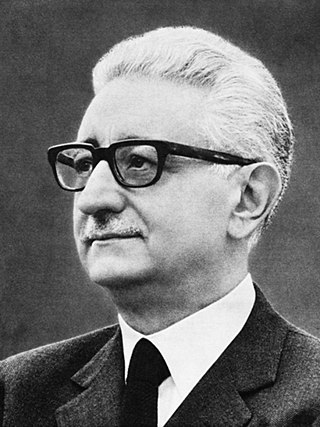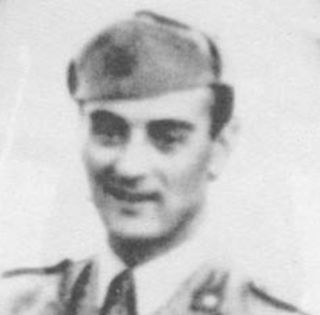Related Research Articles

Indro Alessandro Raffaello Schizogene Montanelli was an Italian journalist, historian and writer. He was one of the fifty World Press Freedom Heroes according to the International Press Institute.

il Giornale is an Italian language daily newspaper published in Milan, Italy.

Pietro Valpreda was an Italian anarchist, poet, dancer and novelist.

The Years of Lead is a term used for a period of social and political turmoil in Italy that lasted from the late 1960s until the late 1980s, marked by a wave of both far-left and far-right incidents of political terrorism.

Raffaele Cadorna Jr. was an Italian general who fought during World War I and World War II. He is famous as one of the commanders of the Italian Resistance against German occupying forces in north Italy after 1943.
Antonio Annarumma was an Italian policeman who was killed at age 22 while serving during a demonstration organized by the Italian (Marxist–Leninist) Communist Party and from the Student Movement. He is sometimes considered to be the first victim of the Years of Lead, a period of social and political upheaval in Italy.
Luciano del Castillo is an Italian photographer and journalist specializing in war photography.

Arrigo Benedetti was an Italian journalist and writer. He was also the editor of important news magazines: Oggi (1939–1941), L'Europeo (1945–54), L'Espresso (1955–63), and Il Mondo (1969–72). Born as Giulio, he changed his name to Arrigo in 1933.

The kidnapping and murder of Aldo Moro, also referred to in Italy as Moro Case, was a seminal event in Italian political history.
Marco Donat-Cattin was an Italian terrorist. He was a founding member of Prima Linea far-left terrorist organization.
The Right group, later called Historical Right by historians to distinguish it from the right-wing groups of the 20th century, was an Italian conservative parliamentary group during the second half of the 19th century. After 1876, the Historical Right constituted the Constitutional opposition toward the left governments. It originated in the convergence of the most liberal faction of the moderate right and the moderate wing of the democratic left. The party included men from heterogeneous cultural, class, and ideological backgrounds, ranging from Anglo-Saxon individualist liberalism to Neo-Hegelian liberalism as well as liberal-conservatives, from strict secularists to more religiously-oriented reformists. Few prime ministers after 1852 were party men; instead they accepted support where they could find it, and even the governments of the Historical Right during the 1860s included leftists in some capacity.

The Alessandria–Novara–Arona railway is a railway line in Italy that connects Alessandria to Arona on Lake Maggiore, passing through Novara.

Inge Feltrinelli was a German-born Italian photographer and director, who with her son Carlo ran the Italian publishing house Giangiacomo Feltrinelli Editore.

The 1971 Italian presidential election was held in Italy on 9–24 December 1971.
Mario Cervi was an Italian essayist and journalist.
Storia d'Italia is a monumental work of the journalist and historian Indro Montanelli, written in collaboration with Roberto Gervaso and Mario Cervi from 1965 to 1997. The idea of a series of books about the history of Italy came to Montanelli after a conversation with Dino Buzzati. Montanelli initially proposed the idea to Mondadori, who wasn't interested. Montanelli then spoke to Longanesi, who agreed to publish the prologue, Storia di Roma in 1957. Following the success of the book, Rizzoli purchased the rights of the work and republished it in 1959. In 1965 Rizzoli, satisfied with the cultural impact of the book and its commercial success, agreed to publish the ambitious Storia d'Italia.

Leopoldo Longanesi was an Italian journalist, publicist, screenplayer, playwright, writer, and publisher. Longanesi is mostly known in his country for his satirical works on Italian society and people. He also founded the eponymous publishing house in Milan in 1946 and was a mentor-like figure for Indro Montanelli: journalist, historian, and founder of Il Giornale, one of Italy's biggest newspapers.

Alessandro Gerbi, known as Sandro is an Italian journalist, author of several biographies and books on Italian contemporary history.
In Italy, after the Second World War, many armed, paramilitary, far-right organizations were active, as well as far-left ones.

Mario Nudi was an Italian soldier and police officer, the last commander of Benito Mussolini's personal bodyguard.
References
- 1 2 3 "Indro Montanelli". IMDb . Retrieved January 13, 2017.
- ↑ "Mario Cervi". IMDb . Retrieved January 13, 2017.